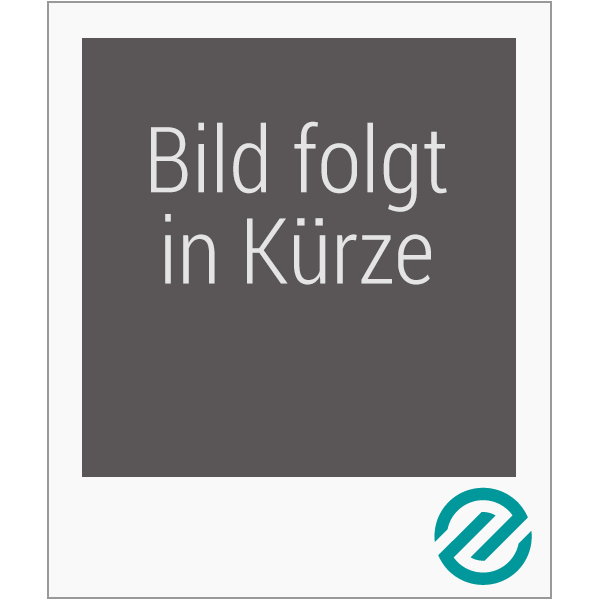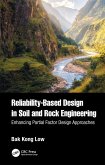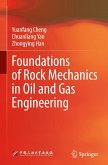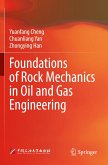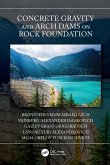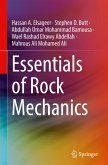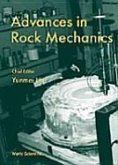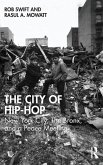New Challenges in Rock Mechanics and Rock Engineering
Herausgeber: Riquelme, Adrian; Ordonez, Salvador; Tomas, Roberto; Cano, Miguel; Pastor, Jose Luis; Benavente, David
Schade – dieser Artikel ist leider ausverkauft. Sobald wir wissen, ob und wann der Artikel wieder verfügbar ist, informieren wir Sie an dieser Stelle.
New Challenges in Rock Mechanics and Rock Engineering
Herausgeber: Riquelme, Adrian; Ordonez, Salvador; Tomas, Roberto; Cano, Miguel; Pastor, Jose Luis; Benavente, David
- Gebundenes Buch
- Merkliste
- Auf die Merkliste
- Bewerten Bewerten
- Teilen
- Produkt teilen
- Produkterinnerung
- Produkterinnerung
New Challenges in Rock Mechanics and Rock Engineering covers the latest breakthroughs and tackles the new challenges in rock mechanics and rock engineering, is aimed at scientists and professionals in these fields, and serves as an essential resource for keeping up to date with industry trends and solutions.
Andere Kunden interessierten sich auch für
![Reliability-Based Design in Soil and Rock Engineering Reliability-Based Design in Soil and Rock Engineering]() Bak Kong LowReliability-Based Design in Soil and Rock Engineering217,99 €
Bak Kong LowReliability-Based Design in Soil and Rock Engineering217,99 €![Foundations of Rock Mechanics in Oil and Gas Engineering Foundations of Rock Mechanics in Oil and Gas Engineering]() Yuanfang ChengFoundations of Rock Mechanics in Oil and Gas Engineering131,99 €
Yuanfang ChengFoundations of Rock Mechanics in Oil and Gas Engineering131,99 €![Foundations of Rock Mechanics in Oil and Gas Engineering Foundations of Rock Mechanics in Oil and Gas Engineering]() Yuanfang ChengFoundations of Rock Mechanics in Oil and Gas Engineering131,99 €
Yuanfang ChengFoundations of Rock Mechanics in Oil and Gas Engineering131,99 €![Concrete Gravity and Arch Dams on Rock Foundation Concrete Gravity and Arch Dams on Rock Foundation]() Bronstein Vadim IzrailovichConcrete Gravity and Arch Dams on Rock Foundation294,99 €
Bronstein Vadim IzrailovichConcrete Gravity and Arch Dams on Rock Foundation294,99 €![Essentials of Rock Mechanics Essentials of Rock Mechanics]() Hassan A. ElsageerEssentials of Rock Mechanics77,99 €
Hassan A. ElsageerEssentials of Rock Mechanics77,99 €![Advances in Rock Mechanics Advances in Rock Mechanics]() Advances in Rock Mechanics143,99 €
Advances in Rock Mechanics143,99 €![The City of Hip-Hop The City of Hip-Hop]() Rob SwiftThe City of Hip-Hop197,99 €
Rob SwiftThe City of Hip-Hop197,99 €-
-
-
New Challenges in Rock Mechanics and Rock Engineering covers the latest breakthroughs and tackles the new challenges in rock mechanics and rock engineering, is aimed at scientists and professionals in these fields, and serves as an essential resource for keeping up to date with industry trends and solutions.
Produktdetails
- Produktdetails
- Verlag: Taylor & Francis Ltd
- Seitenzahl: 1550
- Erscheinungstermin: 31. Dezember 2024
- Englisch
- Abmessung: 246mm x 174mm
- ISBN-13: 9781032551449
- ISBN-10: 1032551445
- Artikelnr.: 71184942
- Herstellerkennzeichnung
- Libri GmbH
- Europaallee 1
- 36244 Bad Hersfeld
- gpsr@libri.de
- Verlag: Taylor & Francis Ltd
- Seitenzahl: 1550
- Erscheinungstermin: 31. Dezember 2024
- Englisch
- Abmessung: 246mm x 174mm
- ISBN-13: 9781032551449
- ISBN-10: 1032551445
- Artikelnr.: 71184942
- Herstellerkennzeichnung
- Libri GmbH
- Europaallee 1
- 36244 Bad Hersfeld
- gpsr@libri.de
Dr. Roberto Tomás is full professor in geological and geotechnical engineering at the Department of Civil Engineering in the University of Alicante (UA), Spain. He received the master's degrees in civil engineering (1st National award) and Geological Engineering (1st National award) and the PhD in Engineering Geology (Special award) in the UA. He is UA leader of the Geotechnical and Structural Engineering (INTERES) research group. He is also member of the UNESCO Land Subsidence International Initiative (former UNESCO Working Group on Land Subsidence), coordinator of the Spanish Working Group on land subsidence and vice-president of the Spanish Society on Rock Mechanics. His main research is in the field of the application of remote sensing techniques for monitoring and modelling of natural hazards (with emphasis in landslides and land subsidence) and infrastructures, as well as for rock mass characterization. He has investigated by InSAR mining subsidence in areas such as La Unión (Spain) and Datong (China), and landslides such as Aitana deep seat (Spain), Huangtupo (China), Xinmo (China) and Daguangbao (China), among others. He has also worked in rock mass characterisation and monitoring using 3D point clouds; and intact rock characterisation when subjected to high temperatures or saturation. He has led or been involved in over 50 national and international research projects as well as in near 70 research contracts with companies. He is author of more than 150 scientific articles and over 200 proceedings and book chapters. He has supervised 12 PhD Thesis in national and international programs. Additionally, he has developed several research stays in different universities and research centres as the Roads Laboratory of the Consejería de Obras Públicas, Urbanismo y Transportes (Spain), the University of Glasgow (UK), the University of Newcastle upon Tyne (UK), the Escuela Superior Politécnica del Litoral (ESPOL) (Ecuador), the Universidade do Minho (Portugal), the Università degli Studi di Firenze (Italia), the Centro de estudios y experimentación de Obras Públicas (CEDEX) (Spain) and the Instituto Geológico y Minero de España (IGME). Dr. Tomás is reviewer of over 30 journals, is editor of the SCI journal Landslides and has been guess editor of multiple SCI journals. Dr. Miguel Cano is PhD, Eng by the University of Alicante (2013), Civil Engineer (B. Eng.) by the Technical University of Valencia (1989), Geological Engineer (B. Eng. + M. Eng., University of Alicante, 2003 - 2nd National Award), Master in Building Construction and Real Estate Management (Technical University of Madrid, 2005) and Specialist in Environmental Impact Assessment and Environmental Audit (Technical University of Madrid, 1996 and 1998, respectively). Currently he is Associate Professor in Geotechnical and Geological Engineering at the Civil Engineering Department of University of Alicante (UA). He is a member of the UA research group of Geotechnical and Structural Engineering (INTERES) since its foundation in 2006. He is also board member of Spanish Society of Rock Mechanics (SEMR). Its main research interests include Rock Mechanics and Geotechnical Engineering at large, with emphasis in heterogeneous rock slopes stability and differential weathering behaviour of heterogeneous rock masses. Professionally, he has worked in companies of EAB group for 20 years, where he specializes in structural and foundation design, structural rehabilitation proposals and forensic geotechnical engineering. He was technical director of the company for the last 5 years in the business. Adrián J. Riquelme Guill has a PhD from the University of Alicante and second-cycle undergraduate degrees in Civil Engineering and Geological Engineering from the Polytechnic University of Valencia. He is currently a PhD Senior Lecturer in the Civil Engineering Department of the University of Alicante. He is a researcher in the Geotechnical and Structural Engineering (INTERES) research group, collaborator of the Geohazards InSAR Laboratory and Modelling Group of Spain's Geological and Mining Institute, and member of the Spanish Society for Rock Mechanics (SEMR), the International Society for Rock Mechanics (ISRM) and the European Geosciences Union (EGU). Moreover, he is a member of the geomechanical classification working group of the SEMR and the working group for the Upgraded ISRM Suggested Method for Discontinuity Characterization. His main research interests are: a) rock mass characterisation and monitoring using 3D point clouds; and b) rock mass geomechanical classifications and intact rock characterisation and c) monitoring and characterisation of landslides, land subsidence and infrastructures using SAR interferometry. Dr. José Luis Pastor is PhD, Eng by the University of Alicante (2016), Civil Engineer (B. Eng.) and Geological Engineer (B. Eng. + M. Eng.) by the same university. Currently he is an Associate Professor in Geotechnical and Geological Engineering at the Department of Civil Engineering of University of Alicante (UA). He is a researcher in the Geotechnical and Structural Engineering (INTERES) research group, collaborator of the Geohazards InSAR Laboratory and Modelling Group of Spain's Geological and Mining Institute, and member of the Spanish Society for Rock Mechanics (SEMR) and Spanish Society of Soil Mechanics and Geotechnical Engineering (SEMSIG). Its main research interests include Rock Mechanics and Geotechnical Engineering at large, with emphasis in slope stability and soil stabilization using industrial by-products. Professionally, he worked in a construction laboratory for 13 years where he was in charge of the geotechnical section, setting the procedure for laboratory and field tests, made several geotechnical reports, structural pathology and foundations design before joining the university as a full-time lecturer. He has developed several research stays in different universities and research centres as the Instituto Geológico y Minero de España (IGME), the National University of Ireland (NUI), the Kyushu University (Japan) or the Saga University (Japan) where he is a periodical visiting researcher. Dr. David Benavente is head of the Applied Petrology Group and a member of the Department of Earth and Environmental Sciences at the University of Alicante. He is a Full Professor in Petrology and Geochemistry. He is BSc in Chemistry from the University of Alicante and PhD from the University of Alicante. His research involves low-temperature geochemistry, where he has a wide experience in the geochemical processes in the critical zone. He has significantly contributed to the understanding of gas generation and gas transport in soils and rocks through the combination of laboratory and field experiments with numerical simulations. Currently, these investigations have evolved to gas transport in volcanic areas that create low-temperature geothermal anomalies. Part of his research has been developed in the modeling of petrophysical and geochemical properties in the porous media of rocks. He is an expert on the development of theoretical models in the crystallization of soluble salts and transport of fluids, and also in studies of the durability of building stones against salts and ice crystallization, and hygric and thermal stress. He is a pioneer in the application of geochemical models to stone conservation studies, specifically in the salt crystallization process as one of the most common and aggressive decay mechanisms. An innovative and singular contribution in this field is the development of specific methodologies in the signal processing of ultrasonic waves as a non-destructive technique. His scientific production includes more than one hundred publications in peer-reviewed SCI journal (with a significant scientific relevance. Some of the high impact journals include Science, Nat Commun, Sci Total Environ and Environ Pollut. Some of his research has been technologically transferred. He has developed new analytical protocols to the petrophysical characterisation of rocks, in both lab and field studies. Moreover, he is a co-author of three computer programs, from connecting lab devices to the analysis of environmental time series (CK; EnvironmentalWaveletTool; and KarsTS). He is a co-author of a Patent to measure the diffusion coefficient of gases of samples with different size and nature (soils, rocks, concretes, synthetic materials, etc.). Dr. Salvador Ordóñez is a distinguished geologist with extensive academic and professional experience. With a Doctorate with Extraordinary Award in Geological Sciences from Complutense University, where he also earned a Bachelor's Degree in the same field, Dr. Ordóñez held various teaching positions at the university level, including roles Assistant Professor and Vice Dean in the UCM; and Associate Professor in the UPM (Geothecnics and Foundations). He has made significant contributions to the field of geological sciences, including research in geological resources such as ornamental rocks, bauxite, and sulfides, as well as regional geology and basin analysis. Dr. Ordóñez is widely published, with over 130 articles in prestigious scientific journals and numerous chapters in both foreign and Spanish scientific books. He has also been actively involved in organizing and presenting at international and national geological conferences. As the founder of the Applied Petrology Laboratory at the University of Alicante, he has played a key role in advancing research and education in geological sciences. Dr. Ordóñez expertise and leadership have been recognized through various awards and appointments, including serving as Rector of the University of Alicante, Rector of UIMP, and Secretary of State for Universities and Research, in the Ministry of Education and Science of Spain. He retired in 2016.
Rock properties, testing methods and site characterization
Rock mechanics for infrastructures
Mining rock mechanics and rock engineering
Design methods and analysis
Rock mechanics for heritage
Geophysics in rock mechanics
Numerical modelling and backanalysis
Monitoring and backanalysis
Underground excavation and support
Risk and hazard
Applicability of EUROCODE-7 in rock engineering
Geomechanics for the oil and gas industry
Ores, building and industrial rocks
Application of artificial intelligence to problems of rock mechanics
Remote sensing in rock mechanics
Geothermal technology
Rock Mechanics education and training
Rock mechanics for infrastructures
Mining rock mechanics and rock engineering
Design methods and analysis
Rock mechanics for heritage
Geophysics in rock mechanics
Numerical modelling and backanalysis
Monitoring and backanalysis
Underground excavation and support
Risk and hazard
Applicability of EUROCODE-7 in rock engineering
Geomechanics for the oil and gas industry
Ores, building and industrial rocks
Application of artificial intelligence to problems of rock mechanics
Remote sensing in rock mechanics
Geothermal technology
Rock Mechanics education and training
Rock properties, testing methods and site characterization
Rock mechanics for infrastructures
Mining rock mechanics and rock engineering
Design methods and analysis
Rock mechanics for heritage
Geophysics in rock mechanics
Numerical modelling and backanalysis
Monitoring and backanalysis
Underground excavation and support
Risk and hazard
Applicability of EUROCODE-7 in rock engineering
Geomechanics for the oil and gas industry
Ores, building and industrial rocks
Application of artificial intelligence to problems of rock mechanics
Remote sensing in rock mechanics
Geothermal technology
Rock Mechanics education and training
Rock mechanics for infrastructures
Mining rock mechanics and rock engineering
Design methods and analysis
Rock mechanics for heritage
Geophysics in rock mechanics
Numerical modelling and backanalysis
Monitoring and backanalysis
Underground excavation and support
Risk and hazard
Applicability of EUROCODE-7 in rock engineering
Geomechanics for the oil and gas industry
Ores, building and industrial rocks
Application of artificial intelligence to problems of rock mechanics
Remote sensing in rock mechanics
Geothermal technology
Rock Mechanics education and training

